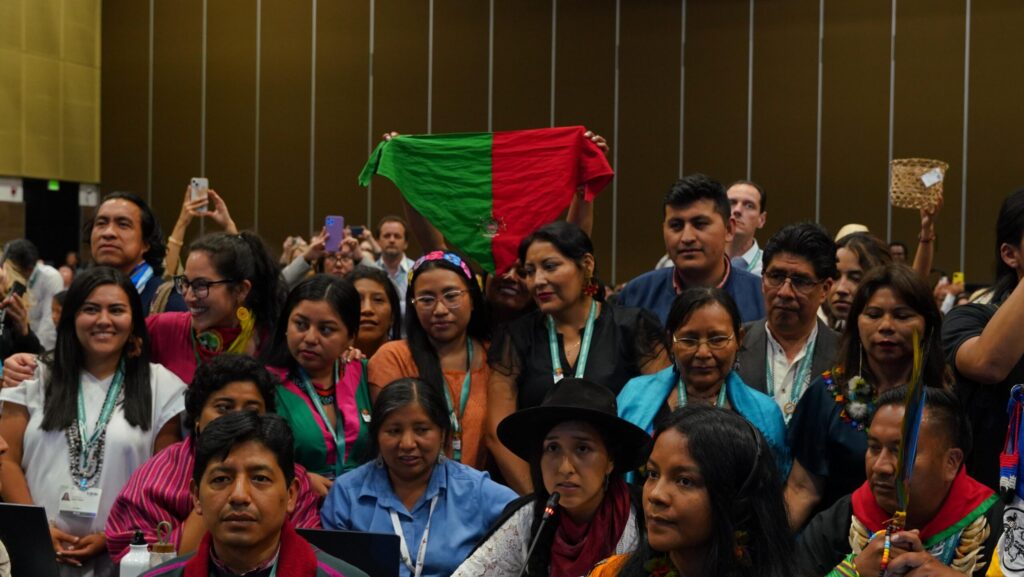The COP16 Biodiversity convention in Cali, Colombia fizzled out on Saturday with many delegates leaving the nation earlier than resolving key points.
The summit stopped wanting delivering its major aim of securing funding for formidable conservation commitments made on the earlier summit, COP15, with critics blaming rich nations and company lobbying.
However some consensus was reached, together with a brand new physique representing Indigenous peoples in conservation efforts and a fund designed to see massive corporations contribute a portion of their revenues to defending nature.
How did the convention finish?
The summit was meant to complete on Friday, November 1, however dragged on into the early hours of Saturday as delegates failed to achieve an settlement on key points.
After many countries’ delegates left to catch flights residence, the convention was unable to achieve quorum and was pressured to finish, inflicting confusion amongst some attendees.
However COP16 has not formally reached a consensus and delegates are anticipated to satisfy subsequent yr at an interim summit in Bangkok to hash out unresolved points.
What was agreed?
One of many key outcomes of the convention was the creation of a subsidiary physique that can enable Indigenous peoples to be represented and consulted on future conservation issues.
Afro-descendant communities have been additionally acknowledged throughout the conference for the primary time.
These agreements have been hailed as “historic” by Susana Muhamad, COP16 President and Colombia’s Surroundings and Sustainable Improvement Minister.
“The worth of the standard information of Indigenous, Afro-descendant and native communities is recognised with this determination and a historic debt has been settled,” stated Muhamad on X.
The Minister shared a video exhibiting representatives of those communities celebrating the announcement.
Estefanía Gonzalez, Deputy Campaigns Director at Greenpeace Andino, additionally praised these outcomes as “massively necessary advances throughout lengthy and difficult negotiations.”
One other key results of the convention was the settlement on a technique to lift cash for conservation by means of contributions from non-public firms.
Particularly, some corporations that revenue from genetic knowledge from nature shall be anticipated to pay 0.1% of revenues or 1% of earnings right into a nature safety fund.
Glenn Walker, Head of Nature Program at Greenpeace Australia Pacific, instructed Latin America Experiences that the transfer was optimistic however didn’t go far sufficient.
“0.1% of company income from nature is barely as much as $1 billion USD a yr. That’s too low, but it surely’s on target,” stated Walker.
He additionally hailed the truth that 50% of those funds will go in direction of Indigenous peoples and native communities.
“They’re those who defend these genetic sources. And they’re those who can do essentially the most with this cash. The period of smash and seize company earnings from nature is ending,” he commented.
What stays unresolved?
Regardless of some settlement, the biggest challenge on the desk at COP16 stays unresolved. Going into the summit, host country Colombia made it clear that the summit’s precedence was securing funding for commitments made at COP15.
On the 2022 summit in Montreal, delegates from rich nations had dedicated to elevating $20 billion in funding for conservation yearly by 2025.
Aside from the genetic knowledge funding, which shall be optionally available for corporations, no financing commitments have been made.
Neidinha Suruí, an activist and chief of the Uru-Eu-Wau-Wau Indigenous Individuals within the Brazilian Amazon, criticized the result of COP16.
“The COP ended badly, with the wealthy international locations… not making any dedication to have a fund to take care of biodiversity, which is a transparent demonstration that they aren’t involved concerning the planet,” she instructed Latin America Experiences.
Suruí was additionally unimpressed by the summit’s commitments to Indigenous illustration.
“The creation of a consultative physique is a step ahead however with no fund to offer sources to native peoples to take care of actions to guard their territories, it should have little impact,” she commented.
The Indigenous chief referred to as for a “everlasting fund to recuperate what has been misplaced,” describing the compensation from genetic knowledge as “inadequate.”
What now?
With the summit closed, delegates should wait a yr to rehash points round biodiversity on the UN degree.
However later this month, international locations will ship delegates to Azerbaijan to participate within the greater profile COP29 local weather convention.
In keeping with An Lambrechts, Head of Greenpeace’s COP16 delegation, the convention in Cali may have a direct bearing on the upcoming summit. She views the failure to ascertain a fund for conservation as damaging to relations between nations.
“With one week to go till COP29 begins, the non-decision on a fund damages belief between World South and North international locations,” stated Lambrechts.
As nations look set to proceed bickering, the every day combat continues for these like Neidinha Suruí residing on the frontlines of local weather change and biodiversity loss.
Her WhatsApp standing merely reads, “defending the forest.”
